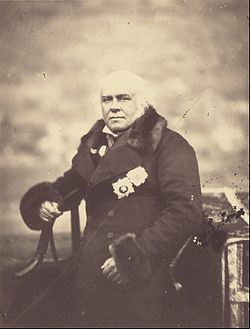James Bruce, 8th Earl of Elgin
|
The Right Honourable The Earl of Elgin KT GCB KSI PC |
|
|---|---|
 |
|
| Viceroy of India | |
|
In office 21 March 1862 – 20 November 1863 |
|
| Monarch | Victoria |
| Preceded by | The Earl Canning |
| Succeeded by |
Sir Robert Napier As Acting Governor-General |
| Governor General of the Province of Canada | |
|
In office 1847–1854 |
|
| Monarch | Victoria |
| Preceded by | The Earl Cathcart |
| Succeeded by | Sir Edmund Walker Head, Bt |
| Governor of Jamaica | |
|
In office 1842–1846 |
|
| Monarch | Victoria |
| Preceded by | Sir Charles Metcalfe, Bt |
| Succeeded by |
George Berkeley As Acting Governor |
| Personal details | |
| Born |
20 July 1811 London, United Kingdom |
| Died | 20 November 1863 (aged 52) Dharamsala, Punjab, India |
| Nationality | British |
| Spouse(s) | (1) Elizabeth Cumming-Bruce (d. 1843) (2) Lady Mary Lambton (d. 1898) |
| Alma mater | Christ Church, Oxford |
| Signature | |
James Bruce, 8th Earl of Elgin and 12th Earl of Kincardine KT GCB KSI PC (20 July 1811 – 20 November 1863) was a British colonial administrator and diplomat. He served as Governor of Jamaica (1842–1846), Governor General of the Province of Canada (1847–1854), and Viceroy of India (1862–1863). In 1857, he was appointed High Commissioner and Plenipotentiary in China and the Far East to assist in the process of opening up China and Japan to Western trade. In 1860, during the Second Opium War in China, he ordered the destruction of the Old Summer Palace in Beijing in retaliation for the torture and execution of almost twenty European and Indian prisoners.
Lord Elgin was the son of the 7th Earl of Elgin and 11th Earl of Kincardine and his second wife.
He shared his birthday 20 July with his father. He had seven brothers and sisters and four half-sisters and one half-brother from his father's first marriage. Lord Elgin's father was reportedly impoverished by the purchase of the Elgin Marbles. His father had acquired them at great expense, but sold them to the British government for much less.
James Bruce was educated at Eton College and Christ Church, Oxford, graduated with a first in Classics in 1832. While at Oxford, he became friends with William Ewart Gladstone.
He was elected at the 1841 general election as a Member of Parliament for Southampton, but the election was declared void on petition. He did not stand in the resulting by-election.
...
Wikipedia
